
Richest Country in the World, Updated on July 2024
What really says if someone is rich? Are they fancy clothes and luxe purchases? Or are there more details that’s not visible from outside?
A person’s richness is not easy to understand, but when it comes to a country’s wealth, there are some factors like the number of palaces, natural resources, or the international trade volume. We’ll get an insider scoop in this article and explore the wealthiest nations together!
Let’s get into more details by uncovering the world of riches and the nuances behind measuring national affluence. GDP, PPP, and GNI will all help us discover what makes a country one of the richest in the world.
Top 15 Richest Countries in the World
What makes a country one of the wealthiest countries? High GDPs, types of resources, and strong economies are some of the factors that make a country stand out from the rest. In this article, we will explore the richest countries and examine their unique features.
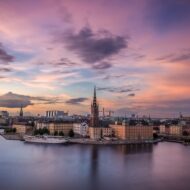
 Sweden
Sweden
Sweden is a Scandinavian country with a population of around 10.5 million people.
Sweden relies on modern agricultural economy. This industry employs over half the domestic workforce. Sweden keeps developing certain industries including engineering, mine, steel, and pulp. They are all competitive industries internationally and have some important well-known companies worldwide. So, the answer of “Where does Sweden’s richness come from?” might be hidden in the economic contribution of these industries.
Having a population of more than 10 million people, Sweden keeps its position as one of the world’s highest proportions of dollar billionaires per capita. In addition, 43 Swedes are listed on the Forbes in its 2024 rich list, whose wealth are worth $1bn or more.
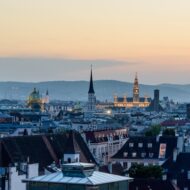
 Austria
Austria
Austria is a landlocked country located in the heart of Europe. The country has a population of approximately 9 million people.
Austria is ranked 14 of the major economies. Considering the purchasing power in the country, Austria makes the list of the world’s riches countries. The inflation in Austria as around 7.81 in 2023.
When it comes to business environment, we can find out a well-developed industry in baking, transportation, services and commercial facilities. These make Austria have a strong labour movement.
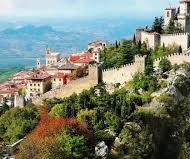
 San Marino
San Marino
San Marino is a small country surrounded by Italy. What’s most known about San Marino is its historic hilltop capital, status as the world's oldest republic, and unique economy that’s based on tourism, banking, and postage stamps.
San Marino is a small country and compared to other countries, it has such a small population. So the country’s per capita GDP outstands at almost $53,000. Moreover, the standard of living in San Marino is comparable to the richest regions of Italy.
Furthermore, the economy in San Marino is mainly based on finance, industry, services, retail, and tourism. As one of the wealthiest countries in the world in GDP per capita, San Marino is comparable not just only to Italy but also to other the most developed European regions as well.

 Netherlands
Netherlands
The Netherlands is located in Western Europe, and bordered by Germany to the east, Belgium to the south, and the North Sea to the north and west.
With a population of more than 17 million, the Netherlands is one of Europe’s most densely inhabited countries. Also, it’s one of the wealthiest countries on earth. Netherlands keeps this position for many reasons. First of all, the country has steady natural gas resources since 1059. It’s a time when wellspring was discovered. So imagine, currently, the Netherlands accounts for more than 25% of all natural gas reserves in the European Union.
Furthermore, there are some other factors developing the Dutch economy. There are some strong international trade links and an encouragement to foreign investment. Let’s not also forget about some of the world’s top companies from the Netherlands including Shell, Unilever, and Philips. In addition, the creative corporate practices help developing notably in technology and renewable energy es well. Besides the digital world, high-quality agricultural goods are sold all over the world including tulips and the famous cheese. Those all make Dutch economy varied and well-developed.

 Australia
Australia
Australia, the world's smallest continent, has a diverse environment ranging from the deserts to the coral ecosystems.
One of the wealthiest countries in the world, Australia has one of the highest average income. So it makes this country up the OECD and the third richest country per adult in the world, staying behind only Switzerland and the US.
There are almost 2.2 million millionaire Australians in the world. This highly developed country has a mixed economy. Meaning that, it’s the 13th largest national economy by nominal GDP, 19th largest by PPP, adjusted GDP, and the 21st largest goods exporter.

 Denmark
Denmark
Denmark is a Scandinavian country. The country is known for its happiness, is famous for its design, rich history, and the concept of "hygge," which embodies coziness and contentment.
Denmark’s GDP per capita is approximately $58,000. It places the country among the top-ranking countries in Europe and the world, in terms of economic prosperity. Diversified economy in Denmark is one of the key factors contributing to the country’s wealth. Moreover, the industrial sector with leading industrious in many areas including pharmaceuticals, renewable energy, and information technology are supporting the ranking of the country as well. There are some known companies helping the economic success of Denmark increase.
The economic growth and stability are supported by the strong welfare system of Denmark and the focus on the education and innovation. The government priotrizes education and research, encouraging entrepreneurship. Globally, Denmark ranks high in innovation and competitiveness.
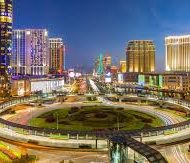
 Macau
Macau
Macau is a fusion of Eastern and Western cultures, renowned for its historic center, casinos, and unique cuisine.
Macau is one of the richest region in the world even though it experienced restrictions because of the three-year epidemic. Macau is also known as “Las Vegas of Asia” ranking in almost US$50 billion in GDP. Its economy is fueled by the tourism, gaming, and service industries. Furthermore, many investors find Macau appealing as it is a tax haven despite the Chinese government’s efforts to stem capital outflows to the region. Still, Macau stays attractive for investment among the Asia Pacific region.
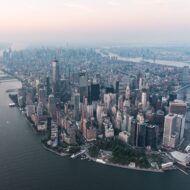
 United States
United States
The United States is one of the richest countries in the world, by which, it gains most of its political power. The country has a population of over 330 million people, making it one of the most populous nations on the planet.
The US consistently maintained its status as a global power for many years. Having one of the most powerful economies, United States has also impressive natural resources including coal, oil, and timber. These sources contribute significantly to the country’s wealth. Likewise, cultural reach of the US, entrepreneurship spirit and high consumer spending are some of the factors of making US one of the richest countries in the world.
The superpower rank high in GDP, however, falls behind some other nations like Luxembourg, considering the GDP per capita. It’s associated with the rising inflation and higher food and energy costs, eroding consumer purchasing power and slowing production output in recent years.
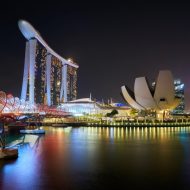
 Singapore
Singapore
Singapore is located in Southeast Asia, is known for its modern skyline, diverse culture, unique food, and status as a global financial hub.
Singapore attracts so many high-net-worth individuals. Starting with its independence in 1965, Singapore’s one-half of population was illiterate. Then the country pulled itself up through hard work and smart policies. Then, Singapore became one of the business-friendly places in the world. And today, it’s a trade center, manufacturing and financial hub. In addition, the 90% of adult population is literate.
However, Singapore experienced the pandemic-driven economic downtown in 2020. Even though the economy shrank by 3.9%, it bounced back in 2023 and grew by 8.8%.
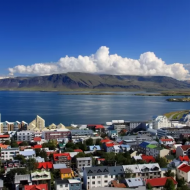
 Iceland
Iceland
Iceland is one of the Nordic countries and it is located in North Atlantic, known for its breathtaking natural beauty and high standard of living.
Iceland is situated between North America and Europe in the Atlantic Ocean. Approximately 400,000 people boasts an advanced economy in Iceland. The economy is primarily based on tourism, fisheries and aluminum production. Furthermore, Iceland has a highly educated and English-proficient workforce with a high standard of living and low social inequality.
Iceland is not a member of the European Union, however, the country is integrated into the EU through the Agreement on the European Economic Area. Despite the strong economy, Iceland faces challenges including a small domestic market, labor regulations, and exports concentrated on aluminum and fishing products. Volcanic and seismic risk may also create risk and concerns.
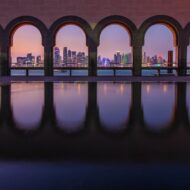
 Qatar
Qatar
Qatar is a small country but it’s a wealthy nation on the Arabian Peninsula. Qatar is known for its modern and unique architecture, oil courses and gas reserves.
Qatar has been recognized as one of the world’s wealthiest nations, securing a spot in the top 10 richest countries based on Gross Domestic Product (GDP) per capita.
Qatar is one of the world’s wealthiest nations based on Gross Domestic Product (GDP) per capita. As one the wealthiest country in the Arab World, Qatar steps forth with its oil, gas and petrochemical reserves. In addition, the population of this country is so small, just about 3 million people. Through its architecture, luxury shopping malls and fine cuisine, Qatar is top of the list of the world’s richest countries for 20 years.
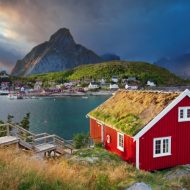
 Norway
Norway
Norway is a Scandinavian country known for its fjords and mountains. It’s a popular destination for outdoor enthusiasts and nature lovers.
Norway has the largest oil reserves in Europe after Russia and it’s one of the world’s richest countries. The economy of Norway, when measured per member of its population, is nearly twice that of the UK and bigger than that of the US.
Norway is a country with the highest living standards. The rich economy is based on many reasons. Oil and gas exports make the economy efficient and stable, helping Norway to become one of the richest countries for many more years to come.
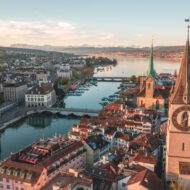
 Switzerland
Switzerland
Switzerland, situated in the Alps, is renowned for its beautiful scenery, popular watches, and delicious chocolate.
Switzerland once again comes out on top when it comes to the mean average wealth per adult. Around one adult in six owns assets that’s worth more than one million US dollars. As one of the world’s wealthiest countries, it’s been well-known for centuries for its neutrality.
Switzerland has a strong and varied export market. From pharmaceuticals to machinery, there are many contributors to the economy. When the high salaries of Switzerland and Iceland compared, Switzerland’s high salaries are mainly driven by its banking and financial services sector. Moreover, it has lower taxes compared to the EU and EEA.

 Ireland
Ireland
Ireland is one of the richest countries with a land of rolling green hills and ancient Celtic heritage. The country is also famous for its lively pubs, traditional music, and hospitality.
Ireland is one of the largest corporate tax havens and has many benefits for multinationals.
A lot of popular and powerful companies including Apple, Google and Microsoft moved their fiscal residence to Ireland so they can benefit from low corporate tax rate which is 12.5%. The top 20% of the Irish population earns nearly five times as much as the bottom 30%.

 Luxembourg
Luxembourg
Luxembourg is a tiny country situated in Western Europe and bordered by Germany, France, and Belgium.
Luxembourg is the richest country in the world. This ranking position is based on the country’s GDP per capita (PPP), according to the 2024 IMF report. The financial services industry is important for Luxembourg serving as a global hub for private banking.
In terms of GDP per capita, Luxembourg ranks higher than the US and other countries. Main trading partners of Luxembourg are Germany, France and Belgium.
Methodology
GDP: GDP may sound as an industrial term but it’s actually not difficult to understand. As also called as Gross Domestic Product, it’s used to measure the total value of goods and services that a country produces locally in a given period of time, which is usually a year. When it comes to importance of GDP, we can say that it’s an indicator of a country’s economic performance reflecting the size of its economy. It’s generally measured in nominal terms. It means that it’s expressed in the currency of the country where the goods and services are produced.
How can you understand this better? Let’s talk about some examples. Imagine that you plan to make and sell lemonade working from your home in a year. What will you do first? After buying lemons, sugar and water, let’s say for $10, you can sell the lemonade for $30. So, the profit you make here is $20. Now, let’s imagine that thousands of people like you make and sell goods and services. These may change from cars to haircuts but it’s made within a country’s borders. So, the GDP is calculated based on the total value of all of these goods and services produced in a country in a year, by anyone like you.
PPP: PPP stands for Purchasing Power Parity. It’s a measure of the relative value of different currencies. And it’s based on the cost of a common basket of goods and services across different countries. So, PPP takes into account the fact that prices for goods and services can vary widely across countries because of differences in inflation rates, currency exchange rats, and some other factors. PPP provides a more accurate measure of the relative wealth and purchasing power of different countries by adjusting these differences.
Let’s understand PPP better. Imagine comparing the cost of living between two countries. Let’s say we compare the United Kingdom and Turkey. The price of 4 rolls of toilet paper in London is £2.03 (₺46,99). The price of 4 rolls of toilet paper in Istanbul is £2.12 (₺49.07). The hourly minimum wage in the UK is £9,5, which is ₺220, with which you can buy at least 16 rolls of toilet paper. On the other hand, the hourly minimum wage in Turkey is approximately ₺53, corresponding to £2,30, which is barely enough for 4 rolls of toilet paper. It doesn’t matter if the prices in both countries are the same. The purchasing power of individuals in Turkey is still 4 times less than in the UK.
GNI: The last criteria is GNI. It means Gross National Income, a measure of the total income generated by a country’s residents and businesses, including income earned abroad. So, it includes all income earned by a country’s citizens and businesses, regardless of where they are located, the Gross National Income is an important measure of a country’s economic activity and is used to calculate important indicators such as per capita GDP and human development indices.
We can also picture this batter. For instance, let’s consider that you’re a US citizen. However, you work and earn money in Canada. In this case, your income from Canada would be included in the Gross National Income of the United States as you are the resident of the United States.
To summarize, we can say that all three measures are important to assess a country’s economic performance and wealth. However, it’s useful to use them in conjunction with other indicators to provide a more complete picture.
The Verdict
In this article, we discovered together the world’s wealthiest countries, from Luxembourg to Qatar. As we mentioned above, there are multiple criteria to calculate a country’s wealth and richness. GDP, PPP, and GNI are some of the indicators to assess a country’s economic performance.
Thank you for joining us exploring why are these countries some of the richest ones in the world and what make them differentiate from other countries. While you decide to go on a journey, it might help you to discover economic aspects of a destination country to plan your future.
Frequently Asked Questions
The richest countries in the world are those with the highest per capita GDP (Gross Domestic Product), which measures the total value of goods and services produced in a country divided by its population. Some of the richest countries in the world include Qatar, Luxembourg, Singapore, United Arab Emirates, Norway, Switzerland, and the United States.
Many factors contribute to a country’s wealth, including its natural resources, infrastructure, political stability, education levels, innovation and technology, and access to global markets. Countries with stable economies, favorable tax policies, and strong financial and banking sectors often attract foreign investment and generate high levels of economic growth.
Despite their wealth, many of the richest countries in the world still face issues with income inequality. Some countries, such as Norway and Switzerland, have implemented progressive tax systems and social welfare programs to help mitigate income disparities. Others, such as the United States and Singapore, have higher levels of income inequality and are working to address this through policy changes and social programs.
Many countries in the world are considered to be poor or have low levels of economic development. It is important to note that measuring poverty can be complex and there are different ways to do it. Burundi, South Sudan, Malawi, Mozambique, and Niger are some of the poorest countries in the world based on their Gross Domestic Product (GDP) per capita.
Many of the richest countries in the world are also major donors of foreign aid and development assistance. For example, Norway and Sweden are among the world’s top contributors to international aid, while countries like the United States and the United Arab Emirates have made significant contributions to disaster relief and humanitarian efforts in recent years. However, there is an ongoing debate about the effectiveness of foreign aid and the role of wealthy countries in promoting global development and reducing poverty.
According to International Monetary Fund (IMF), the country with the highest GDP per Capita is Luxembourg with 128,820 USD and the country with the lowest GDP per Capita is Burundi with 307 USD. These are, of course, the values from countries that provided GDP per Capita data to IMF. It’s important to note that this is ‘GDP per Capita’ and not ‘GDP’.
The United States has the highest GDP globally, but when considering GDP per capita, it ranks as the eighth wealthiest country.
Qatar, the United Arab Emirates, and Brunei Darussalam are the wealthiest Islamic nations.
Many wealthy people can be found in New York City, Tokyo, San Francisco Bay, London, and Singapore.
Singapore is the wealthiest country in Asia, with a per capita GDP of $67,359.79 (2022). Its highly developed economy focuses on services, especially financial services. Singapore is a major international trade and finance hub, boasting a skilled workforce and a business-friendly environment.
The United States has the world’s largest economy when measured by nominal GDP. The service sector, including finance, real estate, insurance, professional services, and healthcare, is the main contributor. The US is a dominant geopolitical power, capable of maintaining significant external national debt as the world’s primary reserve currency producer. Although the US economy leads in many industries, it faces challenges such as economic inequality, increasing healthcare and social safety net costs, and deteriorating infrastructure.
As of 2023, Bernard Arnault, CEO and chairman of French luxury goods conglomerate LVMH, is the world’s richest person with a net worth of around $237 billion. He claimed the top spot after a decline in Tesla’s share prices reduced Elon Musk’s fortune.

 Sweden
Sweden Austria
Austria San Marino
San Marino Netherlands
Netherlands Australia
Australia Denmark
Denmark Macau
Macau United States
United States Singapore
Singapore Iceland
Iceland Qatar
Qatar Norway
Norway Switzerland
Switzerland Ireland
Ireland Luxembourg
Luxembourg



3 thoughts on "Richest Country in the World, Updated on July 2024"
Luxembourg is the richest country in the world, with a GDP per capita of over $109,000. Luxembourg’s wealth stems from its high-income service sector, particularly banking and finance, as well as its favorable tax policies and political stability. Luxembourg has a high quality of life with excellent healthcare, education and infrastructure.
Luxembourg is a fascinating country, and it is no surprise that it is one of the wealthiest in the world. Its high-income service sector, particularly banking and finance, has played a major role in its success. Luxembourg is also known for its favorable tax policies and political stability, which have attracted businesses and individuals from all over the world.
It’s actually a cool and useful piece of information. I am satisfied that you just shared this useful information with us. Please stay us up to date like this. Thanks for sharing.